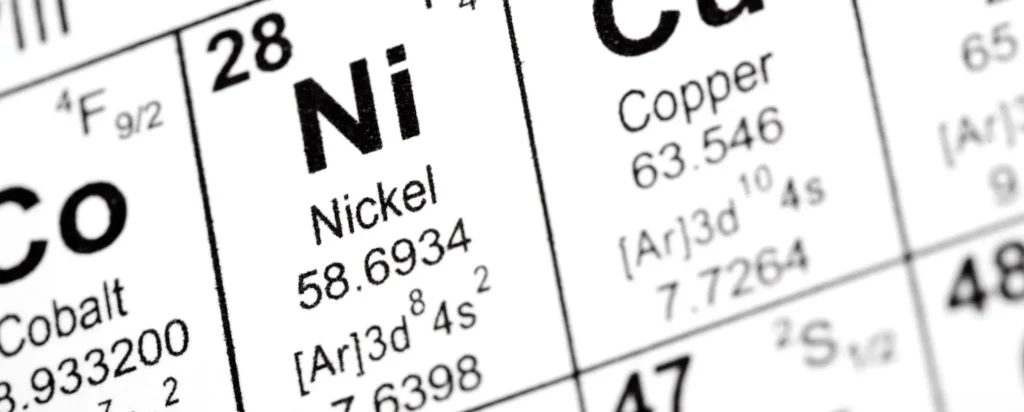Pure Nickel: Properties, Applications, and Machining Characteristics

Pure Nickel: Characteristics and Applications

Pure nickel is a high-purity metal with a nickel content of 99% or higher, valued for its excellent corrosion resistance, heat resistance, and superior workability across various industries.
This article provides a detailed explanation of the fundamental properties of pure nickel and its applications in different fields.
Pure nickel refers to a high-purity metal with a nickel content of 99% or more. This metal is particularly valuable in the chemical industry, demonstrating remarkable corrosion resistance in harsh environments such as alkaline solutions and halogen gases.
Furthermore, pure nickel exhibits excellent electrical conductivity and weldability, though caution is necessary as it may cause allergic reactions in humans.
Due to its exceptional properties, pure nickel, along with nickel alloys, is often selected as a key material for chemical-related applications.
Characteristics of Pure Nickel

Pure nickel possesses the following characteristics, making it widely utilized in industries such as chemicals, electronics, aerospace, and medical devices.
Corrosion Resistance
Pure nickel is highly valued for its chemical stability, particularly its outstanding corrosion resistance. It maintains its properties even when exposed to highly corrosive environments, including acids, alkaline solutions, and chlorine gas. It also has excellent resistance to both seawater and freshwater, making it a preferred material for marine equipment and water treatment facilities.
This outstanding corrosion resistance of pure nickel is also used in critical components such as chemical reactors and transport pipes, providing stable performance over extended periods.
Heat Resistance
Pure nickel has a very high melting point (1455°C), allowing it to function without compromising its properties, even at extreme temperatures.
This high heat resistance plays a crucial role in aerospace and energy industries where extreme temperature conditions are common.
Additionally, pure nickel retains its performance in low-temperature environments, making it suitable for applications in cold regions and outer space.
Workability
Pure nickel is a relatively soft metal with high ductility, making it easy to process.
This is a major advantage in custom-made parts manufacturing. Because the metal is soft, processes such as extrusion, bending, and punching can be performed more easily than with harder metals, greatly improving manufacturing efficiency.
Its excellent ductility is particularly beneficial for producing components with fine details or complex shapes, especially in precision fields like electronics and medical devices.
Applications of Pure Nickel

Pure nickel is rarely used on its own and is more commonly alloyed with other metals. Below are some specific examples of its applications:
Chemical Plant Equipment
Pure nickel is an ideal material for chemical plants due to its superior corrosion resistance.
Components such as reaction vessels, pipes, and valves are often exposed to harsh chemicals like acids and alkalis, and using pure nickel significantly enhances their durability.
In particular, pure nickel is chosen for chemical reactors and piping systems that transport highly corrosive substances, ensuring long-term stable performance.
Electrical and Electronic Components
Pure nickel is highly valued for electronic components due to its superior electrical conductivity.
It is used in battery terminals and mobile phone components, providing reliable electrical connections and long-lasting performance.
Additionally, it is utilized in lead frames for circuit boards and heat-resistant terminals, helping maintain performance even in high-temperature environments.
The adoption of pure nickel is essential for the efficient and safe operation of electronic devices, making it a key material in advanced technologies like smartphones and computers.
Plating
Pure nickel is widely used in plating due to its attractive luster.
This enhances the aesthetics of decorative products, including automotive and motorcycle parts, furniture, and accessories.
In addition to its visual appeal, nickel plating protects surfaces, further improving corrosion resistance. Because of its durability and elegant finish, pure nickel plating is also preferred for luxury items, ensuring a long-lasting aesthetic appeal.
Positioning of Pure Nickel in Cutting Processes

As mentioned earlier, while pure nickel has excellent workability, it also presents certain machining challenges.
This metal has high tensile strength, hardness, and superior heat resistance, allowing it to withstand high temperatures generated during processing. Due to these excellent properties, processing pure nickel requires special tools and techniques different from those used for ordinary steel or aluminum.
Specifically, the use of ultra-hard tools, utilization of coolants, and adjustment of cutting speed and depth are recommended. These measures are important to minimize the effects of heat generated during processing.
Trust Koyo High Precision for Machining Materials
At Koyo High Precision, we combine cutting-edge technology with years of hands-on experience to expertly handle the machining of even the most difficult-to-cut materials.
No matter how challenging the material, we can identify the perfect machining conditions by carefully monitoring chip formation, tool wear, cutting surface quality, and even the sounds during machining.
We are committed to providing customized solutions that meet your unique needs. Contact us today for consultations or quotations — we’re here to help with all your difficult-to-machine material requirements.
